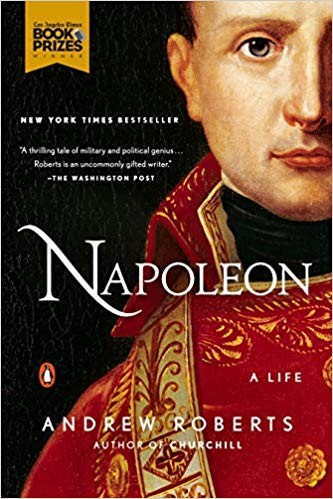This was most interesting to me as a study of leadership style. I see micromanagement as a character flaw, but Roberts argues that Napoleon could often focus on insignificant details and still get major things done. I’m not sure if it’s in spite of, or because of. Napoleon’s relationship with common soldiers was also very interesting, he seemed to strike just the right balance of relatability and distance to inspire fierce loyalty.
Assessing Napoleon as a ruler, there’s some contradiction between deep social conservativism and desire to move the country forward. The Napoleonic Code, as an example, was a progressive reform that set France’s legal system on a more modern rationalist course. At the same time, it centralized power and brought things more under his direct control.
I found myself wondering sometimes what things were like for the common soldier, and how you would hype yourself up to fight the Austrians for like the fifth time over territory you’d repeatedly traded back and forth. Roberts clearly admires Napoleon, and when you read a book like this you have to guard yourself against the impulse to see rulers at the protagonist of history. The reader needs to be aware to refocus when necessary on how all of this affected ordinary people, both in France and the countries Napoleon warred with.
I noted the line that Napoleon’s base of support was “landlords, tradesmen, and the better-off peasantry”. In other words, the Revolutionary Era equivalent of people who own car dealerships. Sound familiar?
The weaker part of the book was the battle descriptions. This has never been a particular interest of mine, so it takes an extraordinary author to get me interested in these, and it didn’t happen here. I read through this quickly, probably not absorbing as much as I should have, and it seems to me that players dropped in and out of the narrative randomly.
In works of fiction I’ll often pick favorites among secondary characters, so two “characters” I rooted for here, although that’s an admittedly strange thing to do in a history book:
Jean Bernadotte – Bernadotte married Napoleon’s first love who rejected him, and was part of Napoleon’s extended family. As a consequence Napoleon apparently kind of hated him. Bernadotte was a Marshal, but Napoleon gave him all the worst duties and no credit, in a way that kind of seemed like bullying. Eventually, Bernadotte became the King of Sweden and IMMEDIATELY betrayed Napoleon, which is a hilarious reversal. Bernadotte’s descendants are still the monarchs of Sweden.
Louis-Nicolas Davout – I liked this guy just because he was the most competent and independent of Napoleon’s marshals, but was chronically underused because he didn’t click with Napoleon personally. I guess we’ve all had a bad boss. Davout also survived the Napoleonic Wars and made his peace with the King.
I read this in preparation for the Ridley Scott film which I understand plays up the Napoleon/Josephine romance a lot more. Roberts doesn’t think very much of that part of Napoleon’s life and de-emphasizes it.








